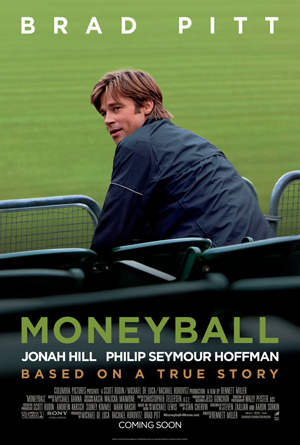Moneyball ****
 At first glance, Moneyball will ignite interest among Brad Pitt fans. On second glance, it will turn some away because of its baseball subject matter. Sports films are an acquired taste and will never fully convert those who are not into the sport in question. Therefore, as one of the latter, Moneyball is a real eye opener, and not because it suddenly stirs a dormant interest in the sport, but because the baseball could be argued as being the parallel theme to the overriding one of the ‘little guy’ taking on and shaking up the system from within. In this sense, there is something to be gained from it.
At first glance, Moneyball will ignite interest among Brad Pitt fans. On second glance, it will turn some away because of its baseball subject matter. Sports films are an acquired taste and will never fully convert those who are not into the sport in question. Therefore, as one of the latter, Moneyball is a real eye opener, and not because it suddenly stirs a dormant interest in the sport, but because the baseball could be argued as being the parallel theme to the overriding one of the ‘little guy’ taking on and shaking up the system from within. In this sense, there is something to be gained from it.
It’s based on the true story of Billy Beane (Pitt), the once would-be baseball superstar who still hurts from his failure to live up to expectations on the field and turns to baseball management. It’s nearly the start of 2002 season, and Billy’s small-market Oakland Athletics (the A’s) have lost their star players to the bigger, wealthier clubs. Billy must rebuild the team and compete on a third of the payroll. He discovers and hires whizzkid, Yale-educated economist Peter Brand (Jonah Hill) who believes in Bill James’ computer-driven statistical analysis to win games, previously ignored by the baseball establishment. Together they challenge the old baseball guard by installing overlooked or dismissed baseball players, based on a combination of key skills, and begin winning several games in a row.
Moneyball plays out much like any other baseball film but with a couple of narrative twists. Even though you don’t necessarily need to know anything about baseball, naturally, Moneyball will have a greater impact on someone who does possess the historical and factual elements of the game. It’s essentially an inspirational David verses Goliath film, a topical corporate shakedown story that anyone can relate to in this day and age, and it’s all down to the Pitt-Hill chemistry that keeps you engaged.
As co-producer and star, Pitt takes on by far his biggest film challenge yet with Beane and shaping this story to appeal to a wide-ranging audience. He is as courageous as his dynamic and daring character that’s the film’s driving tour de force. Pitt is strikingly reminiscent of a younger Redford and his gutsy turn in the 1984 baseball film, The Natural. Everything really hinges on Beane’s actions and reactions that keep things scintillating to watch, with Hill as Brand as the ‘voice of reason’ in the corner in a straighter stance, much like his character Cyrus in the 2010 film. In fact, Hill again demonstrates that taking on the straighter-laced roles where he can diffuse the tense with intelligent, deadpan humour input is his true acting forte.
Thankfully, Pitt’s infectious energy transcends the wordy baseball mumbo jumbo, and the passion that all involved feels for the game shines through. Part of this is the sense that both you and the characters are venturing into the unknown and want to see change in an unbalanced system. The script glosses over the ones and zeros and endless charts of the analysis and manages to make a coherent narrative out of Michael Lewis’ complex book “Moneyball: The Art of Winning an Unfair Game”. Again, this is down to the winning onscreen team of Pitt and Hill, but more so because of award-winning The Social Network writer Aaron Sorkin being part of the scriptwriting team.
Capote director Bennett Miller turns to his muse, Philip Seymour Hoffman, to portray the stubborn face of the old system by casting the actor as Art Howe, the A’s team coach. Although against the statistical invasion of the game, Howe is delivered a chance to know what it feels like to succeed against all adversity, with the A’s winning 20 games in a row, which broke an actual AL record in 2002. As an underdog himself with little say in his team’s makeup, Howe begins to appreciate how the ‘misfit toys’ – as the players are called – can have their glory, and it’s spiritually uplifting to watch.
Thankfully, Miller does not take the conventional, backslapping route at the end, and throws up a few satisfying surprises where his lead character is involved. Sadly, the system wins, which admittedly does have the sense of defeated purpose. However, Moneyball has to be taken as one of those films where the journey is more important than the end result, and it’s one of guts, determination and sporadic humour. Full credit to Pitt, too, for creating an ingenious and unorthodox career-defining role for himself at this stage in his varied career.
4/5 stars
By @FilmGazer